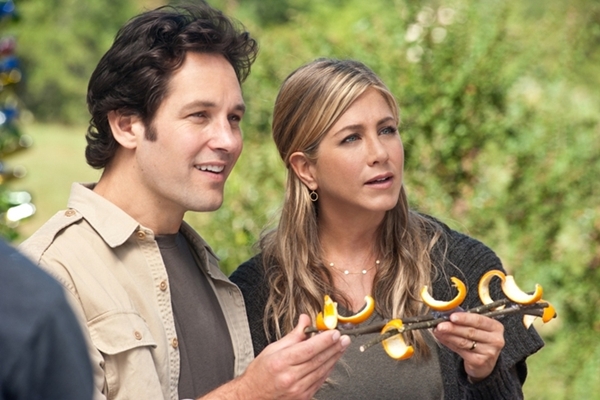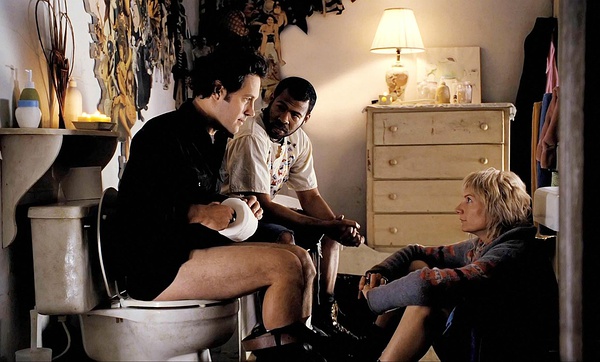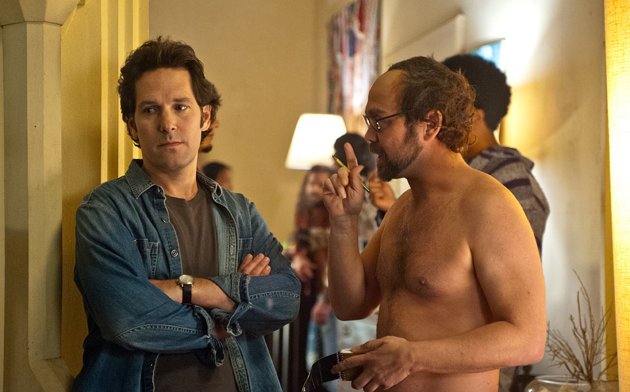Wanderlust Review
The humor of
Wanderlust and hippie communes share a similar mantra: embrace it or get the heck out.
Role Models director David Wain and comedian Ken Marino have written a genuinely funny movie, only one that’s kind of pasted together like a spontaneous collage of humorous characters and moments rather than strung together with any notion of a compelling story.
In that sense, it’s almost a miracle
Wanderlust works at all. A chance encounter with a hippie bed and breakfast and an impulsive decision to live free of social constructs hardly qualifies for conflict-resolution storytelling, but several colorful characters and a pair of likable leads maintain our curiosity as to what might happen next.

George (Paul Rudd) and Linda (Jennifer Aniston) have just purchased an apartment in New York City. Days later, George finds himself jobless thanks to an FBI investigation shutting down his company and Linda fails to successfully pitch her hard-hitting penguin documentary to HBO. They then head for Georgia to stay with George’s successful brother (Ken Marino) and his family, but after a night’s stay in “Elysium,” they determine that a little detachment could be a good thing.
Although rarely the source of humor, Aniston reminds us she’s an effortless leading lady that can roll with any kind of comedy. Rudd offers the usual charms and some dynamite improv. A scene where he psychs himself up in the mirror could be considered one of his best ever. It certainly ranks as the film’s most hysterical moment.
As for the ensemble at large, Elysium teems with curious characters, including a nudist winemaker/aspiring author (Joe Lo Truglio), a spiritually virile classical guitar player that everyone adores (Justin Theroux) and a free-love yoga teacher (Malin Ackerman) among others. Rather than being pure stereotypes of hippies and eccentrics, the actors genuinely embody their characters. Not every bit is funny, but few lapse into unfunny territory—that is so long as Wain’s mix of deadpan and obscene humor works for you.

George and Linda’s two-week trial run puts their marriage to the test of course, but little of that matters. In a way it works, because inserting straight scenes with the intent of drumming up the marital conflict would have marred the pacing, not to mention been remarkably unoriginal. On the other hand, it’s tough to feel anything when the couple is at odds over whether they should have a sexually liberated marriage. So long as their attempt to do so yields comic results (and it sure does), who cares?
Oddly enough,
Wanderlust warrants numerous comparisons to the free-spirited lifestyle it both celebrates and pokes fun at. Although contemporary R-rated comedy techniques abound, (At what point will comedies decide to stop barraging audiences with flopping penises?) they seem less contrived in this movie. Everything feels more organic and care-free. Maybe it’s as simple as the fact that nudists and hallucinogenics make more sense in a movie about hippies, but either way it works.
But more than that, it’s the choice to avoid the obvious contemporary jokes that sit right in front of our noses that earns
Wanderlust kudos. Not one scene deals with either George or Linda getting frustrated over bad cell phone reception or saying or doing anything to debase or devalue the commune or the lifestyle there for the sake of humor. That fact will go under-appreciated by most viewers.
 Wanderlust
Wanderlust essentially lives and dies with its purposelessness. So many comedies self-inflict their wounds by trying to create and maintain too much of a logical plot, whereas this one spares us the trouble. At the same time, a noteworthy premise—executed well or not—seizes the necessary attention for audiences to feel invested in a comedy.
Like its title implies, this movie meanders spontaneously in search of only laughs. It’s the kind of strategy that will likely divide audiences, but those like myself who feel Wain and company pulled it off will develop a sizable soft spot for this simple but quirky comedy.
 George (Paul Rudd) and Linda (Jennifer Aniston) have just purchased an apartment in New York City. Days later, George finds himself jobless thanks to an FBI investigation shutting down his company and Linda fails to successfully pitch her hard-hitting penguin documentary to HBO. They then head for Georgia to stay with George’s successful brother (Ken Marino) and his family, but after a night’s stay in “Elysium,” they determine that a little detachment could be a good thing.
Although rarely the source of humor, Aniston reminds us she’s an effortless leading lady that can roll with any kind of comedy. Rudd offers the usual charms and some dynamite improv. A scene where he psychs himself up in the mirror could be considered one of his best ever. It certainly ranks as the film’s most hysterical moment.
As for the ensemble at large, Elysium teems with curious characters, including a nudist winemaker/aspiring author (Joe Lo Truglio), a spiritually virile classical guitar player that everyone adores (Justin Theroux) and a free-love yoga teacher (Malin Ackerman) among others. Rather than being pure stereotypes of hippies and eccentrics, the actors genuinely embody their characters. Not every bit is funny, but few lapse into unfunny territory—that is so long as Wain’s mix of deadpan and obscene humor works for you.
George (Paul Rudd) and Linda (Jennifer Aniston) have just purchased an apartment in New York City. Days later, George finds himself jobless thanks to an FBI investigation shutting down his company and Linda fails to successfully pitch her hard-hitting penguin documentary to HBO. They then head for Georgia to stay with George’s successful brother (Ken Marino) and his family, but after a night’s stay in “Elysium,” they determine that a little detachment could be a good thing.
Although rarely the source of humor, Aniston reminds us she’s an effortless leading lady that can roll with any kind of comedy. Rudd offers the usual charms and some dynamite improv. A scene where he psychs himself up in the mirror could be considered one of his best ever. It certainly ranks as the film’s most hysterical moment.
As for the ensemble at large, Elysium teems with curious characters, including a nudist winemaker/aspiring author (Joe Lo Truglio), a spiritually virile classical guitar player that everyone adores (Justin Theroux) and a free-love yoga teacher (Malin Ackerman) among others. Rather than being pure stereotypes of hippies and eccentrics, the actors genuinely embody their characters. Not every bit is funny, but few lapse into unfunny territory—that is so long as Wain’s mix of deadpan and obscene humor works for you.
 George and Linda’s two-week trial run puts their marriage to the test of course, but little of that matters. In a way it works, because inserting straight scenes with the intent of drumming up the marital conflict would have marred the pacing, not to mention been remarkably unoriginal. On the other hand, it’s tough to feel anything when the couple is at odds over whether they should have a sexually liberated marriage. So long as their attempt to do so yields comic results (and it sure does), who cares?
Oddly enough, Wanderlust warrants numerous comparisons to the free-spirited lifestyle it both celebrates and pokes fun at. Although contemporary R-rated comedy techniques abound, (At what point will comedies decide to stop barraging audiences with flopping penises?) they seem less contrived in this movie. Everything feels more organic and care-free. Maybe it’s as simple as the fact that nudists and hallucinogenics make more sense in a movie about hippies, but either way it works.
But more than that, it’s the choice to avoid the obvious contemporary jokes that sit right in front of our noses that earns Wanderlust kudos. Not one scene deals with either George or Linda getting frustrated over bad cell phone reception or saying or doing anything to debase or devalue the commune or the lifestyle there for the sake of humor. That fact will go under-appreciated by most viewers.
George and Linda’s two-week trial run puts their marriage to the test of course, but little of that matters. In a way it works, because inserting straight scenes with the intent of drumming up the marital conflict would have marred the pacing, not to mention been remarkably unoriginal. On the other hand, it’s tough to feel anything when the couple is at odds over whether they should have a sexually liberated marriage. So long as their attempt to do so yields comic results (and it sure does), who cares?
Oddly enough, Wanderlust warrants numerous comparisons to the free-spirited lifestyle it both celebrates and pokes fun at. Although contemporary R-rated comedy techniques abound, (At what point will comedies decide to stop barraging audiences with flopping penises?) they seem less contrived in this movie. Everything feels more organic and care-free. Maybe it’s as simple as the fact that nudists and hallucinogenics make more sense in a movie about hippies, but either way it works.
But more than that, it’s the choice to avoid the obvious contemporary jokes that sit right in front of our noses that earns Wanderlust kudos. Not one scene deals with either George or Linda getting frustrated over bad cell phone reception or saying or doing anything to debase or devalue the commune or the lifestyle there for the sake of humor. That fact will go under-appreciated by most viewers.
 Wanderlust essentially lives and dies with its purposelessness. So many comedies self-inflict their wounds by trying to create and maintain too much of a logical plot, whereas this one spares us the trouble. At the same time, a noteworthy premise—executed well or not—seizes the necessary attention for audiences to feel invested in a comedy.
Like its title implies, this movie meanders spontaneously in search of only laughs. It’s the kind of strategy that will likely divide audiences, but those like myself who feel Wain and company pulled it off will develop a sizable soft spot for this simple but quirky comedy.
Wanderlust essentially lives and dies with its purposelessness. So many comedies self-inflict their wounds by trying to create and maintain too much of a logical plot, whereas this one spares us the trouble. At the same time, a noteworthy premise—executed well or not—seizes the necessary attention for audiences to feel invested in a comedy.
Like its title implies, this movie meanders spontaneously in search of only laughs. It’s the kind of strategy that will likely divide audiences, but those like myself who feel Wain and company pulled it off will develop a sizable soft spot for this simple but quirky comedy.